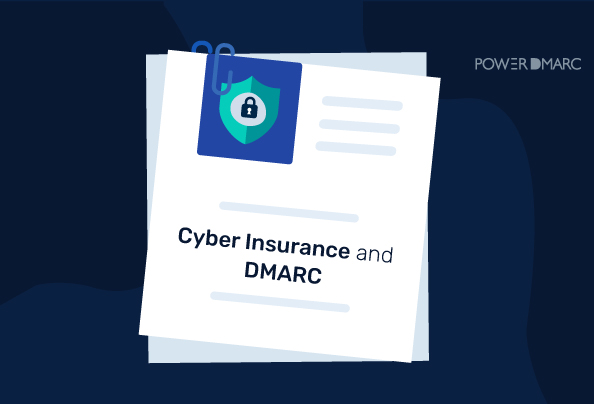Business Email Compromise (BEC), ransomware attacks, and social engineering attacks like domain spoofing continue to be reasons for the majority of cyber insurance claims since 2020. As per reports by a renowned US-based cyber insurance firm, a significant percentage (more than 50%) of the insurance claims made by their customers within the first half of 2021 were as a result of being hit by BEC and social engineering attacks.
Furthermore, the costs associated with these attacks are continuing to rise as employees are settling down into their remote working environments. To address these concerns, cyber insurance firms are including email authentication protocols such as a DMARC setup, SPF, and DKIM, as a part of their customers’ cyber insurance package to deal with the costs associated with BEC and reduce business risk. Cyber insurance companies strongly recommend the implementation of anti-spoofing technologies like DMARC and multi-factor authentication for businesses of all sizes.
Need help with generating your DMARC record? Generate DMARC record instantly using our free tool.
What is Cyber Insurance?
Cyber attacks such as large-scale data breaches, BEC, spoofing, and ransomware which has recently become the talk of the town, cost global businesses a hefty sum every year: we are talking billions! To cover the costs associated with these attacks, insurance firms offer their customers cyber insurance. In the form of financial aid, this cyber insurance package helps its customers recover from a financial backlog after being hit with a major attack incident.
Cyber insurance is something that can come in handy for any online business, be it a startup or an enterprise. It covers a part of the cost associated with a variety of cyberattacks including but not limited to: BEC, phishing, ransomware, malware, etc, that can be claimed by the insured company from its insurer.
Insurance software development plays a pivotal role in enhancing the efficiency and accuracy of cyber insurance processes, enabling seamless integration of DMARC (Domain-based Message Authentication, Reporting, and Conformance) to mitigate email-based cyber threats.
Why should DMARC be an active part of your Cyber Insurance plan?
Cyber insurance firms are proactively partnering up with DMARC software service providers to offer their customers effective solutions for dealing with email compromise. This is because DMARC makes use of technology that is designed to minimize BEC, helping email receiving servers reject malicious messages before they even land in the inbox.
It is important to understand that cyberspace is constantly evolving. It isn’t a static universe that can be tamed by using one software solution to meet all needs. The “one shoe fits all” method will not be able to withstand the constant change in email fraud tactics deployed by cybercriminals. Hence emerging technologies like DMARC can offer a certain degree of security against many if not all of these domain impersonation threats.
Email Security Vulnerabilities: the driving force behind most cyber insurance claims
Cyber insurance and security experts have statistically analyzed how email security vulnerabilities remain the driving force behind most of their customers’ cyber insurance claims. Such vulnerabilities include incorrectly or poorly configured email authentication protocols, or the lack of it altogether. The primary reason for this is, most people don’t have a clear understanding of the protocols and how to leverage them to maximize their domain’s security.
PowerDMARC simplifies the DMARC, SPF, DKIM implementation processes for organizations. Our managed security services are a complete solution for organizations in need of assistance with their email authentication deployment, management, and configuration. You can start your journey towards safer email, and reduce business email compromise today by signing up for a free DMARC analyzer.
- Fix SPF Permerror: Overcome SPF Too Many DNS Lookups Limit - April 26, 2024
- How to Publish a DMARC Record in 3 Steps? - April 2, 2024
- Why is DMARC failing? Fix DMARC Failure in 2024 - April 2, 2024
